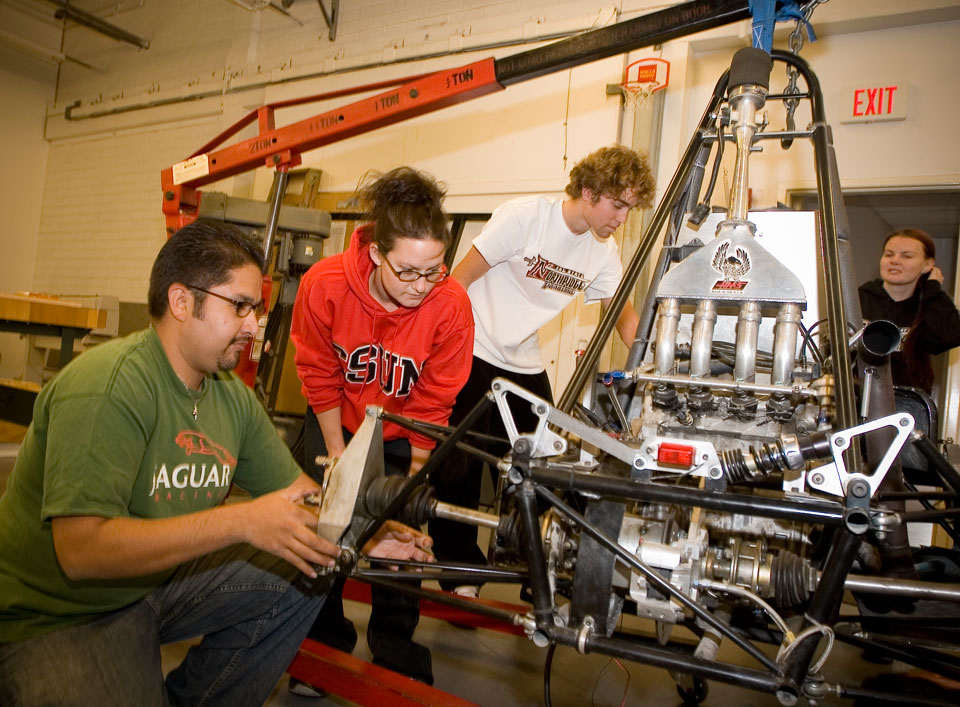CSUN Faculty Break Down Silos to Help Train Tomorrow’s Workforce

Faculty in the College of Engineering and Computer Science, Mike Curb College of Arts, Media and Communication, and Michael D. Eisner College of Education are part of a consortium that won a $6 million grant to build career pathways for students that lead to highly skilled, well-paying jobs. Photo by Lee Choo.
Faculty at California State University, Northridge are breaking down silos within the university and across the academic divide as they work with Glendale Community College and K-12 educators on a project to train tomorrow’s workforce.
The consortium, which includes Glendale Community College and the Glendale and Burbank school districts, is one of only 39 entities selected for funding out of approximately150 proposals submitted to address the existing skills gap in California.
“Industry leaders have told us that they need employees who have hands-on experiences so that when they are hired, they can immediately begin to work with little or no additional training,” said S. Jimmy Gandhi, a manufacturing systems engineering and management professor at CSUN. “Students are graduating knowing the basic theories. They need to know the practical aspects as well to make them more marketable and employable.”
Gandhi said the consortium’s proposal has a three-pronged approach to helping the students access more career options.
Gandhi and CSUN mechanical engineering professor George Youssef and art professors Dave Moon and Mark Farquhar are working with their counterparts at Glendale Community College to ensure that students in their programs are getting valuable hands-on experiences in addition to a theoretical understanding of their chosen fields. At CSUN, students will have the option of getting certificates in innovation and entrepreneurship, digital manufacturing, web design and gaming that attest to the practical training.
Additionally, special education professor Wendy Murawski, elementary education professor Stephen Holle and staff member Kathy James in the Center for Teaching and Learning in the Eisner College are working with teachers in the Burbank and Glendale school districts to ensure that educators there have the knowledge and skills they need to inspire young people to pursue high-skilled careers.
“We can’t continue looking to solve the workforce problem just from our departments or institutions,” Gandhi said. “To succeed, we have to reach across divisional as well as institutional boundaries and work together with our partners. We have to think outside our own boxes to come up with solutions that will inspire students from the K-12 environment on up, and ensure that as they start heading down their chosen career paths, the students have the tools to succeed.”
Gandhi noted that members of the consortium will meet regularly with industry leaders to make sure their concerns about a trained workforce are heard. The kickoff meeting for this grant, which included all partners, took place on Oct. 29.
Gandhi said consortium members recognize that their approach — which crosses educational and institutional boundaries — could serve as a model for others, and they plan to publish several papers on their progress.
“If this can be replicated in other fields and we can have higher impact, so much greater are our returns,” he said. “We can’t keep doing things the way we have always done. We need to think creatively and work together to come up with solutions. This project will be an exemplification of how that can be done.”
Serving more than 40,000 students each year, CSUN is one of the largest universities in the United States. CSUN ranks 10th in the country in awarding bachelor’s degrees to underrepresented minority students, fifth nationally in awarding master’s degrees to Hispanic students and enrolls the largest number of deaf and hard-of-hearing students of any U.S. state university. CSUN’s 171 academic programs and engaged centers enjoy international recognition for excellence. CSUN currently partners with more than 100 institutions of higher education in 22 countries around the globe and attracts the largest international student population of any U.S. master’s level institution. Situated on a 356-acre park-like setting in the heart of Los Angeles’ San Fernando Valley, the campus features modern educational buildings and world-class LEED Gold-certified performing arts and recreational facilities recognized as among the best in the country. CSUN is a welcoming university that champions accessibility, academic excellence and student success.

 experience
experience